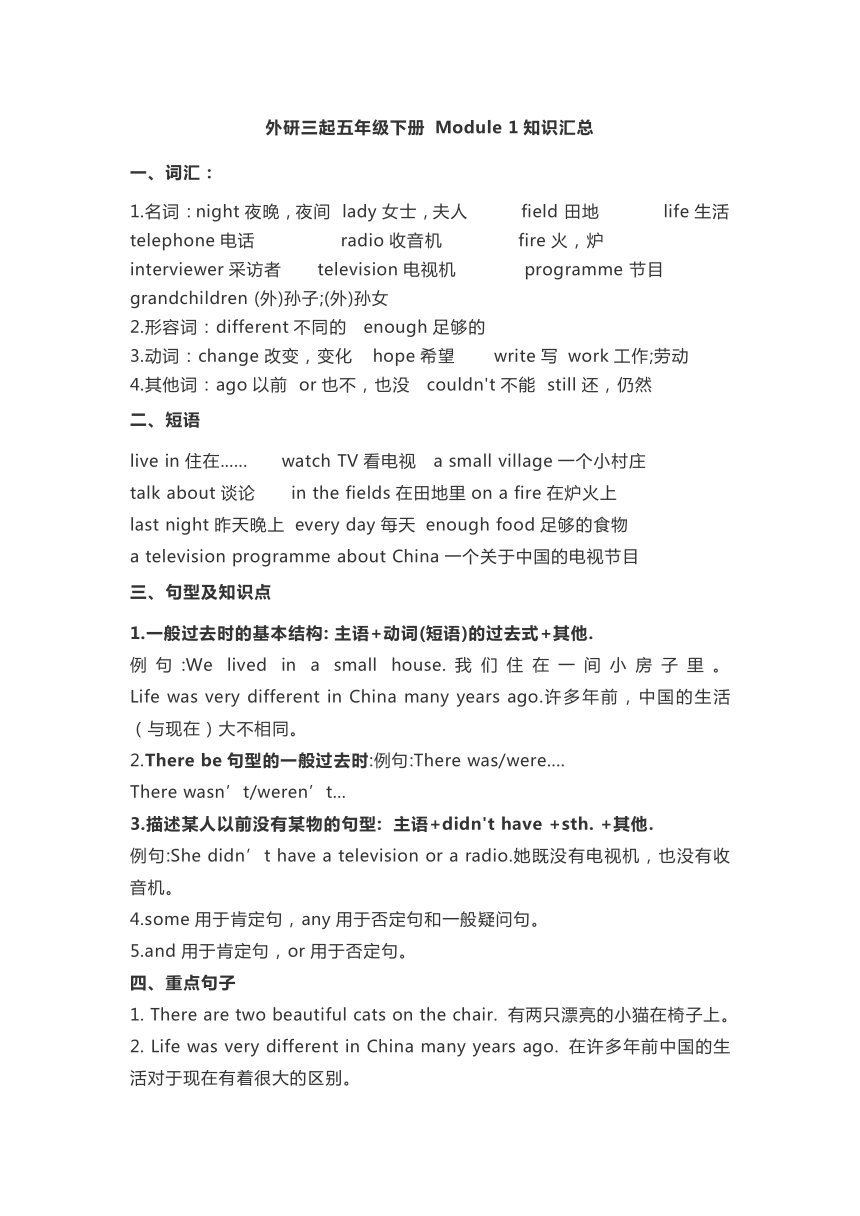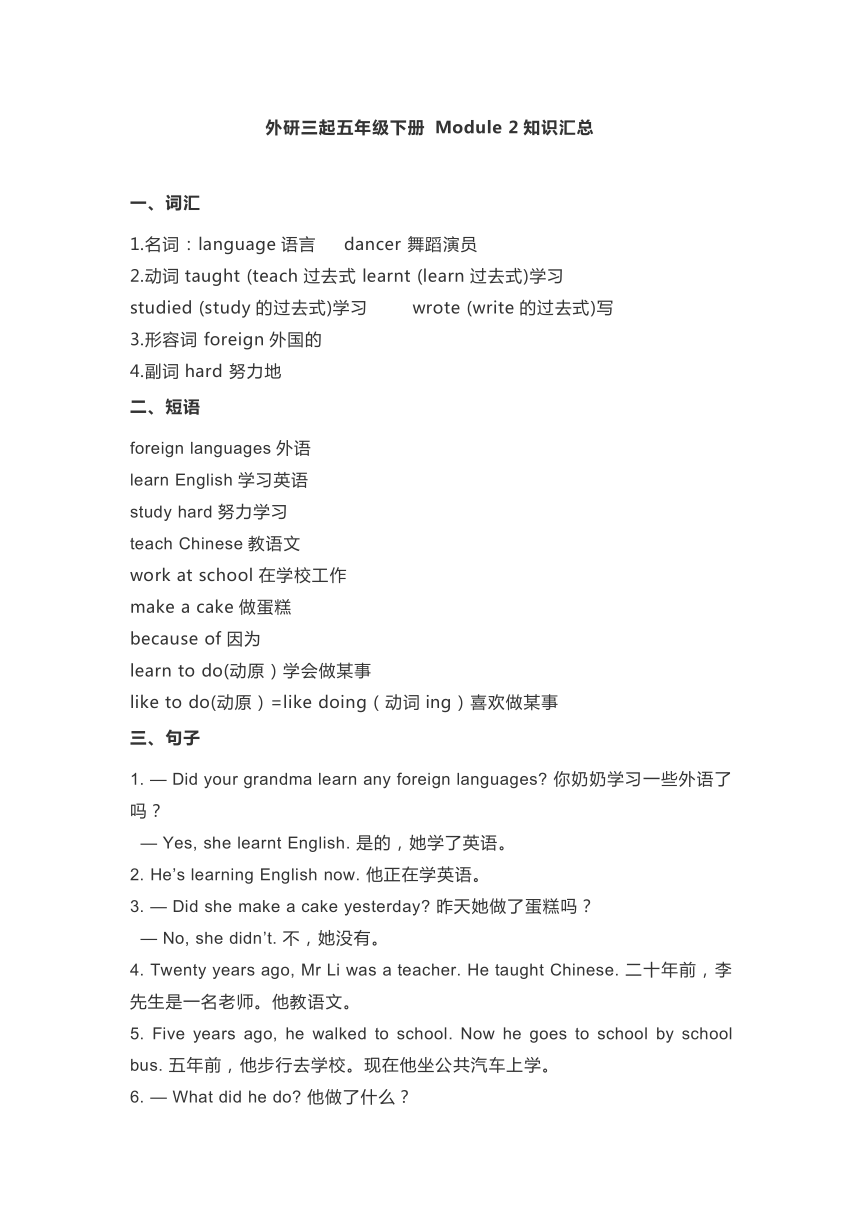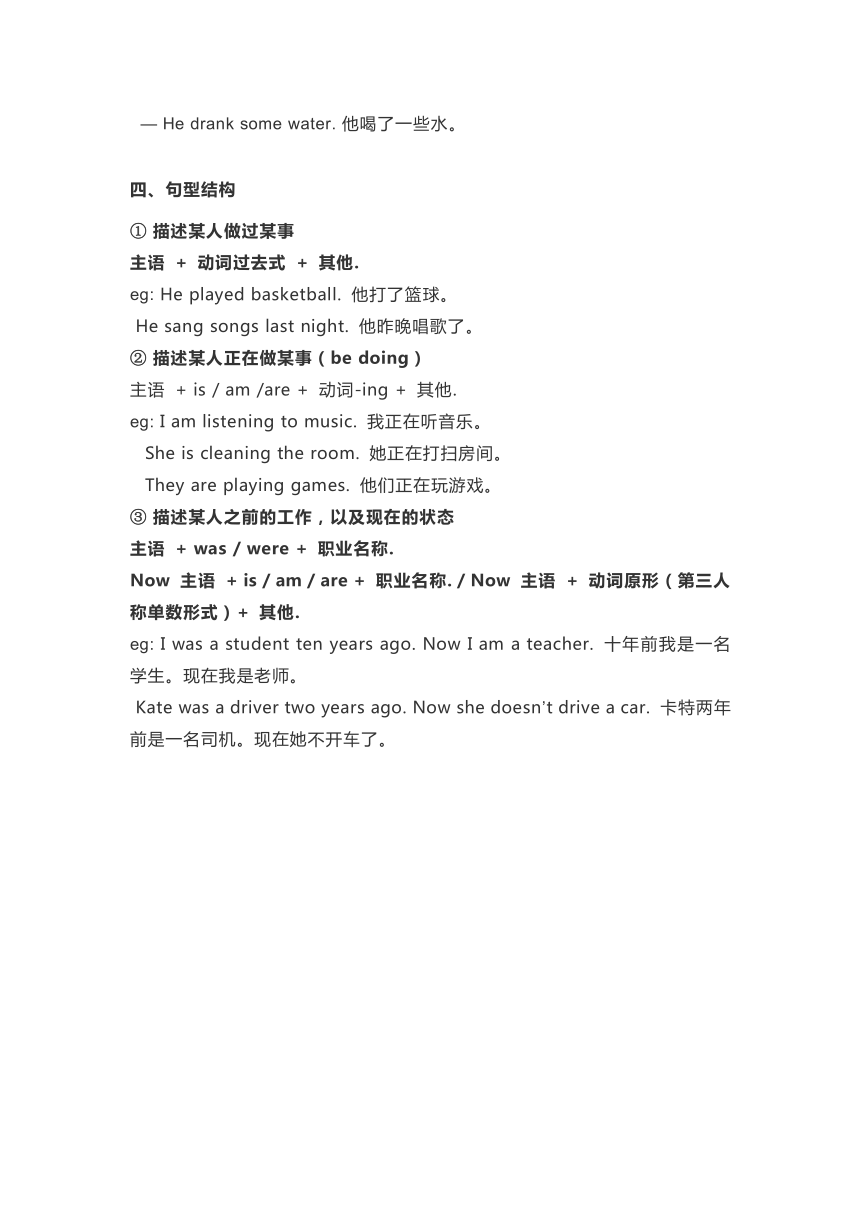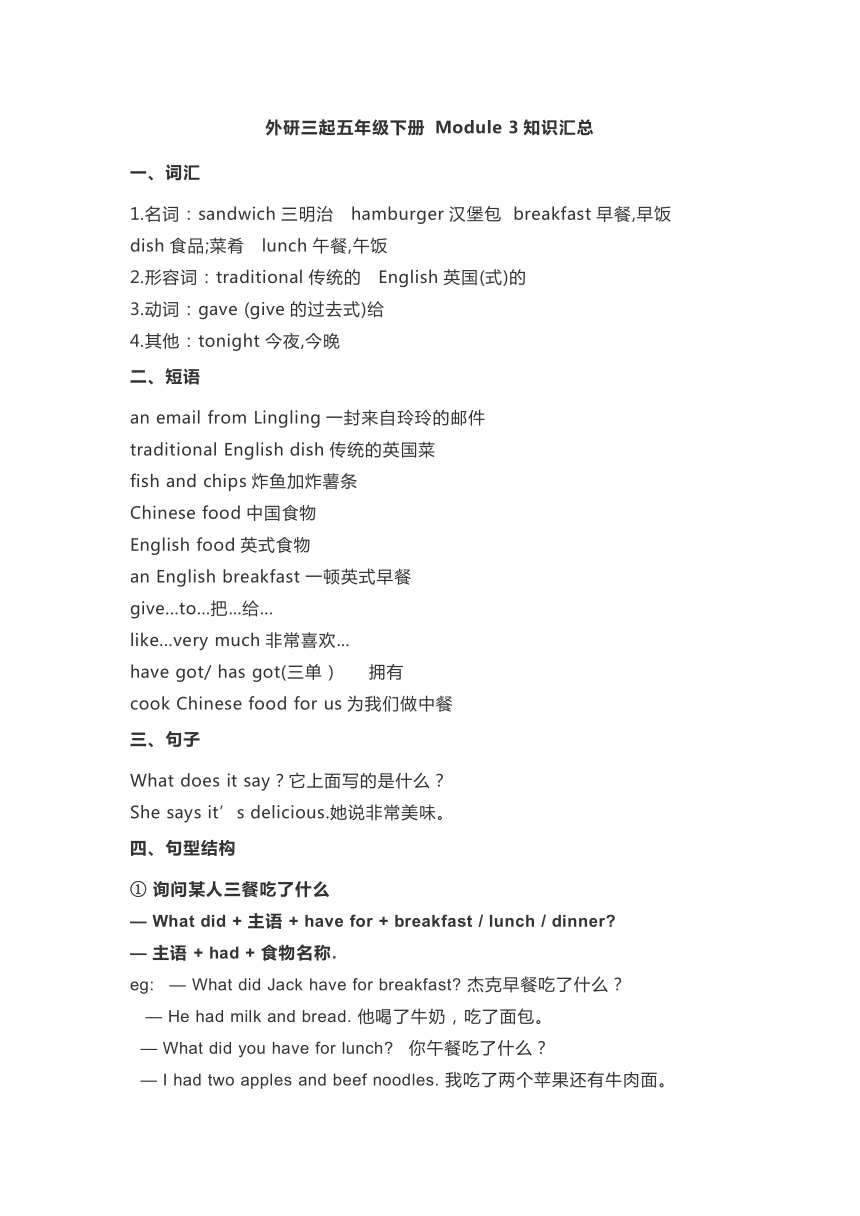Module1- M10知识清单2023-2024学年外研版(三起)英语五年级下册
文档属性
| 名称 | Module1- M10知识清单2023-2024学年外研版(三起)英语五年级下册 |

|
|
| 格式 | docx | ||
| 文件大小 | 43.3KB | ||
| 资源类型 | 教案 | ||
| 版本资源 | 外研版(三年级起点) | ||
| 科目 | 英语 | ||
| 更新时间 | 2024-07-02 00:00:00 | ||
图片预览





文档简介
外研三起五年级下册 Module 1知识汇总
一、词汇:
1.名词:night夜晚,夜间 lady女士,夫人 field 田地 life生活
telephone电话 radio收音机 fire火,炉
interviewer采访者 television电视机 programme 节目
grandchildren (外)孙子;(外)孙女
2.形容词:different不同的 enough足够的
3.动词:change改变,变化 hope希望 write写 work工作;劳动
4.其他词:ago以前 or也不,也没 couldn't不能 still还,仍然
二、短语
live in住在...... watch TV看电视 a small village一个小村庄
talk about谈论 in the fields在田地里on a fire在炉火上
last night昨天晚上 every day每天 enough food足够的食物
a television programme about China一个关于中国的电视节目
三、句型及知识点
1.一般过去时的基本结构: 主语+动词(短语)的过去式+其他.
例句:We lived in a small house.我们住在一间小房子里。Life was very different in China many years ago.许多年前,中国的生活(与现在)大不相同。
2.There be句型的一般过去时:例句:There was/were....
There wasn’t/weren’t...
3.描述某人以前没有某物的句型: 主语+didn't have +sth. +其他.
例句:She didn’t have a television or a radio.她既没有电视机,也没有收音机。
4.some用于肯定句,any用于否定句和一般疑问句。
5.and用于肯定句,or用于否定句。
四、重点句子
1. There are two beautiful cats on the chair. 有两只漂亮的小猫在椅子上。
2. Life was very different in China many years ago. 在许多年前中国的生活对于现在有着很大的区别。
3. We lived in a small house. We didn’t have enough food. There weren’t many buses. There weren’t any televisions. 我们住在小房子了里。我们吃不饱。没有许多小汽车,也没有电视机。
4. China is changing. 中国正在改变。
5. He has got strong legs. He can jump really far. 他有强壮的腿,他能跳得很远。
6. She didn’t have a television or a radio. 她没有电视机和收音机。
外研三起五年级下册 Module 2知识汇总
一、词汇
1.名词:language语言 dancer 舞蹈演员
2.动词taught (teach过去式 learnt (learn过去式)学习
studied (study的过去式)学习 wrote (write的过去式)写
3.形容词 foreign外国的
4.副词hard 努力地
二、短语
foreign languages外语
learn English学习英语
study hard努力学习
teach Chinese教语文
work at school在学校工作
make a cake做蛋糕
because of因为
learn to do(动原)学会做某事
like to do(动原)=like doing(动词ing)喜欢做某事
三、句子
1. — Did your grandma learn any foreign languages 你奶奶学习一些外语了吗?
— Yes, she learnt English. 是的,她学了英语。
2. He’s learning English now. 他正在学英语。
3. — Did she make a cake yesterday 昨天她做了蛋糕吗?
— No, she didn’t. 不,她没有。
4. Twenty years ago, Mr Li was a teacher. He taught Chinese. 二十年前,李先生是一名老师。他教语文。
5. Five years ago, he walked to school. Now he goes to school by school bus. 五年前,他步行去学校。现在他坐公共汽车上学。
6. — What did he do 他做了什么?
— He drank some water. 他喝了一些水。
四、句型结构
① 描述某人做过某事
主语 + 动词过去式 + 其他.
eg: He played basketball. 他打了篮球。
He sang songs last night. 他昨晚唱歌了。
② 描述某人正在做某事(be doing)
主语 + is / am /are + 动词-ing + 其他.
eg: I am listening to music. 我正在听音乐。
She is cleaning the room. 她正在打扫房间。
They are playing games. 他们正在玩游戏。
③ 描述某人之前的工作,以及现在的状态
主语 + was / were + 职业名称.
Now 主语 + is / am / are + 职业名称. / Now 主语 + 动词原形(第三人称单数形式)+ 其他.
eg: I was a student ten years ago. Now I am a teacher. 十年前我是一名学生。现在我是老师。
Kate was a driver two years ago. Now she doesn’t drive a car. 卡特两年前是一名司机。现在她不开车了。
外研三起五年级下册 Module 3知识汇总
一、词汇
1.名词:sandwich三明治 hamburger汉堡包 breakfast早餐,早饭
dish食品;菜肴 lunch午餐,午饭
2.形容词:traditional传统的 English英国(式)的
3.动词:gave (give的过去式)给
4.其他:tonight今夜,今晚
二、短语
an email from Lingling一封来自玲玲的邮件
traditional English dish传统的英国菜
fish and chips炸鱼加炸薯条
Chinese food中国食物
English food英式食物
an English breakfast一顿英式早餐
give...to...把...给...
like...very much非常喜欢...
have got/ has got(三单) 拥有
cook Chinese food for us为我们做中餐
三、句子
What does it say?它上面写的是什么?
She says it’s delicious.她说非常美味。
四、句型结构
① 询问某人三餐吃了什么
— What did + 主语 + have for + breakfast / lunch / dinner
— 主语 + had + 食物名称.
eg: — What did Jack have for breakfast 杰克早餐吃了什么?
— He had milk and bread. 他喝了牛奶,吃了面包。
— What did you have for lunch 你午餐吃了什么?
— I had two apples and beef noodles. 我吃了两个苹果还有牛肉面。
外研三起五年级下册 Module 4知识汇总
一、词汇
1.名词:student学生 library图书馆 CD激光唱片,光盘
idea主意,想法 shelf架子 dictionary词典;字典
card 卡片 project项目 way方法,方式
guide介绍,指南,手册 information信息 film电影
e-book电子书 topic话题
2.形容词:heavy重的,沉的 wrong错误的
3.动词:sent (send的过去式)发送,寄 put放,安放 ask 邀请
4.其他:dear哎呀 on关于
二、短语
a home library一个家庭图书馆
good idea好主意
library card图书卡,借书证
science project科学项目
on this shelf在这个架子上
get information获取信息
on this topic关于这个话题
put...on...把...放...上
send...to...把...送给...
ask...to do(动原)叫某人/邀请某人做某事
in the wrong place在错误的地方
三、句子
1. Let’s make a home library. 我们做一个家庭图书馆吧。
2. A friend sent these books and CDs to us. 一个朋友送了这些书和光盘给我们。
3. These are all books about science. 这些书全是关于科学的。
4. These are the library cards for our friends. 这是给朋友们的图书馆卡片。
5. — Where are the books about sports 关于体育的书在哪?
— They are on the Shelf C. 他们在C架子上。
The books on Shelf B are about computers. B架子上的书是关于计算机的。
Let’s put them with the CDs.我们把它们和光盘放一起吧。
—Where can I find... 我在哪里可以找到...
—You can find ...+介词短语
四、句型结构
① 提出建议
Let’s + 动词原形 + 其他.
eg: Let’s go home. 我们回家吧。
Let’s clean our room. 我们打扫房间吧。
② 介绍某些物品的类别
These are ... about ...
eg: These are books about history. 这些书是关于历史的。
These cards about words. 这些卡片是关于单词的。
③ 某人能从某处得到信息
主语 + can get information from...
eg: We can get information from television. 我们能从电视上得到信息。
We can get information from the internet. 我们能从网上获取信息。
外研三起五年级下册 Module 5知识汇总
一、词汇
1.名词:wheel轮子 pocket口袋,兜 umbrella雨伞
2.形容词:easy容易的,不费力的 broken坏的,破的 light轻的
lovely美丽的 hard困难的,费力的
3.副词: too太,过于
4.动词:try试,尝试 take选择要;选择购买
二、短语
look at看……
too big太大
fly a kite放风筝
ride a bike骑自行车
that's lovely那真是太可爱了
too + 形容词 + for 某人 对某人来讲太......
三、句子
1. This black bag is nice. It’s big! 这个黑色的包很好,很大!
2. Look at this blue one. It’s big and light. 看这个蓝色的,又大又轻。
3. It’s too big for you. 对你来讲太大了。
4. It has got a panda on it. 在它上面有个熊猫。
5. You can take it to China. 你能带它回中国。
6.Try this white one.试一下这个白色的。
7.It will be easy for you to carry.对你来说会很容易携带。
四、句型结构
1.描述事物特征的句型:It's got+特征/It’s+形容词.
例句:It's got two pockets.它有两个口袋。
It's light.它很轻
2.表达“对…来说做某事是...的”的句型:It's too+形容词+for+sb.
例句:lt's too heavy for me to carry it.它对我来说太重了。
五、近反义词
big—small good—bad happy—sad new—old
long—short young—old light—heavy tall—short
clean—dirty easy—hard
六、主格、宾格、形容词性物主代词
主格 宾格 形容词性物主代词(...的)
I me my
you you your
we us our
he him his
she her her
it it its
they them their
外研三起五年级下册 Module 6知识汇总
一、词汇
1.名词:west西,西方 east 东,东方 south南,南方 north北,北方
parent 母亲;父亲;家长 moon月亮,月球 June六月 July七月
rest休息
2.动词:stay停留 remember记得 get到达 rode(ride的过去式)骑
二、短语
in July在七月 last year去年 ride a horse骑马get here/there到达这/那
have a lovely time度过了一段愉快的时光 visit the Tianchi Lake游天池have a rest 休息 climb the Tianshan Mountain爬天山
in the east/west/ south/north of China在中国的东部/西部/南部/北部
of course当然 photos of me and my family我和我家人的照片
stay with my grandma for a week和奶奶呆了一周 every year每年
Li people黎族
三、句型:
1.询问对方假期去了哪里的句型及回答
—Where did you go for the holidays
—I went to+地点名词.
例句:—Where did you go for the holidays 你假期去了哪里?—I went to Sichuan. 我去了四川。
2.询问对方是不是和谁一起去的的句型及回答:—Did you go with sb.
—Yes ,I did. No ,I didn' t.
3.询问某地的方位的句型及回答:
—Where is +地点?
—It's in the east/ west/south/north of+其他.
外研三起五年级下册 Module 7知识汇总
一、词汇
1.名词:evening傍晚,晚上 worker工人 quarter一刻钟
taxi出租车,计程车 factory 制造厂;工厂
2.形容词: late近日暮的;近深夜的;时间不早的early早的 tired劳累的
3.动词:worry焦虑,担心
4.其他:to(距整点)差……
二、短语
go to work去工作in the afternoon在下午 a quarter to nine九点差一刻
have breakfast/lunch/dinner吃早中晚餐 every morning每天早上
a quarter to nine九点差一刻 half past seven七点半
that's late/early那太晚/早了 in a factory在工厂
take you to school 带你们去学校 go to bed上床睡觉
三、句型:
1.描述某人的作息时间的句型: 主语+go/goes to work+at+时间点+其他.
例句:My mother goes to work at half past five every morning.我妈妈每天早上五点半去工作。
2.介绍某人职业的句型:主语+be动词+a/an+职业名词.
例句:He's a policeman.他是一名警察。
3.表示某人将要做某事的句型: 主语+will+动词原形+其他.
4.例句:I'll be home at seven o'clock.我将在七点钟到家。
外研三起五年级下册 Module 8知识汇总
一、词汇
1.名词:stick小木棍,小木条 paper纸 word词,字 string线,绳子
2.动词:tied系上 drew 画 cut剪,切,割 paint(用颜料)着色 put放,安放
3.其他:Chinese中国人的(形容词) so如此,这样 piece张,片,块
二、短语
of course 当然 make a kite for her为她制作一只风筝
a great idea一个好主意 on a piece of paper在一张纸
put sticks on it放小木棍 tie strings to it系绳
三、句型:
1.给别人提建议的句型,表示“…怎么样 ”: What about+代词宾格/名词/动名词+其他 例句:What about a toy panda 一个玩具熊猫怎么样?
2.询问某人是否将要做某事的句型: Will+主语+动词原形+其他
例句:Will you help me 你会帮助我吗
3.描述过去做某事的句型: 主语+动词的过去式+其他.例句: I put sticks on it.我把小木条放在它上面。l tied strings to it.我把绳子系在它上面。
4.询问某人将要做什么的句型及回答:
—What will+主语+动词原形+其他
一主语+will+动词原形+其他
例句:—What will you do tomorrow 你明天将要做什么 —I'll go swimming tor morrow.我明天将要去游泳。
5. Thank you for your help.=Thank you for helping me.谢谢你的帮助。
外研三起五年级下册 Module 9知识汇总
一、词汇
1.名词:letter信,书信 theatre剧院 actor演员 joke笑话
history 历史 question问题 show(尤指剧院的)演出,表演
restaurant饭店,餐馆 women(woman的复数形式)女性,妇女
2.动词:told (tell的过去式)口述,讲(故事) wore (wear的过去式)穿
read (read的过去式)读 laugh笑 bring带来,拿来 ask问,询问
forget忘,忘记 borrow借入,借来
3.其他:ready 准备好的 another另一个 after在……后
in在(将来一段时间)之后 soon 不久,很快
二、短语
be going to将要 not.. at all一点都不 a lot很;非常 last week上个星期in three weeks三个星期后(将来时) tell jokes 讲笑话
children's theatre儿童剧院 men’s clothes男性的衣服
listen to...听 before/after the show在演出结束以前/以后
lots of...=a lot of许多,大量 two letters in English两封英文信in+语言
be ready for +名词 为...做好准备 be ready to do sth.准备好做某事
the trip to China/the US中国/美国之旅 go to the cinema去电影院
buy sth. for sb.=buy sb. sth为某人买某物 read a book读书
Chinese history中国历史 borrow a bike for you为你借了一辆自行车
forget to do sth.忘记做某事 CDs of Chinese songs中国歌曲的CD
see you soon回头见
三、句型
1.一般过去时的陈述句: 主语+动词过去式+其他.
例句:Last week we went to a children's theatre.上个星期我们去了一家儿童剧院。
2.a lot的用法 例句:We laughed a lot.我们开怀大笑。
3.询问对方是否做好准备的句型: Are you ready for+其他(名词)
Are you ready for your trip to the US 你为你的美国之行做好准备了吗
4.表达将要做某事的句型:
主语+be动词(am , is , are)+going to+动词原形+其他
例:We are going to see you in three weeks.我们将在三个星期之后去见你。5.表达为某人买了某物的句型: 主语+bought sth. for sb.
例句:Mum bought new T-shirts for you.妈妈为你买了新的T恤衫。
外研三起五年级下册 Module 10知识汇总
一、词汇
1.名词:ticket票 passport护照 airport机场 end结束,终止
American美国人 pet宠物 building建筑物
2.形容词:safe安全的 nervous紧张的 American美国的,美国人的
3.其他: more更多的(量),较多的(量)when在什么时候 speak 说,讲
二、短语
make a list of things to do列一张要做事情的清单 find out发现
all right没事,没问题 in New York在纽约 take a taxi 乘出租车travel by plane乘飞机旅行 at the airport在机场
get up起床 I think so我认为是这样的 it will be all right没问题
at seven o’clock tomorrow morning 明天早上7点
safe trip一路平安 arrive here/there 到达这里/那里
make Chinese food for me为我做中国食物 want to do sth.想要做某事
try American food尝试美式食物
三、句型
1.询问对方将要去哪里的句型:Where are you going (+其他)
例句:Where are you going this weekend, Sam 这周末你将要去哪里,萨姆 --I’m going to the airport.
2.询问对方将在什么时候去某地的句型: When are you going (to)+地点?例句:When are you going to the airport 你将什么时候去机场?--At seven o’clock tomorrow morning.
3.询问对方将和谁一起去某地的句型:
例句:Who's going to the airport with you 谁将和你一起去机场 --My mum.
4.询问某人什么时候做了某事的句型:
例句:When did Daming arrive there 大明什么时候到达那里的?--Yesterday
5.询问某人如何到达某地的句型?
How did you get there 你们怎么到达那里的? --We took a taxi.
6.What are you going to take 你将要带什么?Clothes, shoes, presents, the ticket and my passport. 衣服,鞋子,礼物,票和我的护照。
7. 描述某人想要做某事。I want to find out more about the US. 我想要发现更多关于美国的信息。
特殊动词过去式:
原形 过去式 中文 原形 过去式 中文
am was 是 can could 可以
is was 是 learn learnt 学习
are were 是 teach taught 教授
have had 有;吃;喝 write wrote 写
do did 做;助动词 put put 放
sing sang 唱歌 cut cut 剪
see saw 看见 ride rode 骑
go went 去 draw drew 画画
buy bought 买 fly flew 飞
eat ate 吃 wear wore 穿
drink drank 喝 read read 读
take took 带,拿;拍 feel felt 感觉
make made 制作
come came 来
fall fell 落下
find found 发现;找到
run ran 跑
send sent 发送
tell told 告诉
ring rang 响铃
swim swam 游泳
give gave 给
meet met 遇到
lose lost 丢失
win won 赢
drop dropped 掉落
表示过去的时间词:
yesterday(昨天),then(那时),this morning(今天早上)
last year(去年)last month(上个月)
last week(上周)last holiday(上个假期)
last Sunday(上个星期天)in the past(在过去)...ago(...以前)
外研(三起点)五下常考及易错知识点
1.有了助动词(do,does,did),就要现原形(动词)。
有了情态动(can, can’t,could),就要现原形。can/can’t/can/couldn’t+动原
2. many+可数名词复数
much+不可数名词(cheese, chocolate, juice, milk,rice, meat, water, soup, bread)
注意:people人们(常复)Li people黎族
3.特殊疑问词:听力时听句子开头;选择时看答语。
who--谁;when/what time--时间;where--地点;what--什么; why--为什么,because
how--怎么样,by+交通工具/walk/on foot,take a bus
4.There be 句型:某处有某物。就近原则,单数is 复数are,看后面的名词!名词!名词!
5.祈使句:动原用原形。Please sit down./ Don’t argue.
主格 宾格 形容词性物主代词(...的)
I me my
you you your
we us our
he him his
she her her
it it its
they them their
7.
6.主格做主语,宾格做宾语。动词+宾格,如help her/him;介词+宾格,如for her/him
7.副词(...地)修饰动词:arrive/get here/there
8.this这个--these这些+可数名词复数:these ice creams
that那个--those那些+可数名词复数:those ice creams
9.some用于肯定句,any用于否定句(no/not)和一般疑问句;or用于否定句
10.not ...at all一点也不
11.Let’s +动原。Let’s go! Let’s =let us ;let me动词+宾格
12.an email一封电子邮件,an hour 一小时
13.书写时注意:句子开头要大写,句末标点别忘记。单词不要抄漏抄错!
14.选出不同类单词:一看词性(动词,名词,形容词,副词,介词...);
二看意思;三看结构(ing,ed...)
补全对话:联系上下文:看上一句或下一句+排除法。用什么问就用什么答。
do/does/did/can/could/will/are/is开头的一般疑问句,回答用Yes或者No
阅读:读圈--定位--对比(细心!)--确定。
want to do sth./ forget to do sth./ ask sb. to do sth.
like to do sth.=like doing sth.喜欢做某事
give A to B./ take A to B/ send sth. to sb.
as well 句末,too句末,also句中
小地点at,大地点in
职业:policeman警察 nurse护士 doctor医生 actor演员 worker工人 driver司机
firefighter消防员 teacher老师
时间表达:超过半点用to,没超过用past
四大时态区别:
①一般过去时:主语+V过+其他。/主语+didn't+V原+其他
时间词:yesterday(昨天),then(那时),this morning(今天早上)
last year(去年)last month(上个月)
last week(上周)last holiday(上个假期)
last Sunday(上个星期天)in the past(在过去)...ago(...以前)
②一般现在时:主语+V现+其他。注意三单情况
主语+don't/doesn’t+V原+其他。
时间词:now,every...
③现在进行时:主语+be doing+其他。/主语+be not+其他
时间词:now
④一般将来时:主语+will do+其他。/主语+won't+V原+其他。
主语+ be going to do+其他。/主语+be not+going to do
时间词:tomorrow,next..., soon, this....
一、词汇:
1.名词:night夜晚,夜间 lady女士,夫人 field 田地 life生活
telephone电话 radio收音机 fire火,炉
interviewer采访者 television电视机 programme 节目
grandchildren (外)孙子;(外)孙女
2.形容词:different不同的 enough足够的
3.动词:change改变,变化 hope希望 write写 work工作;劳动
4.其他词:ago以前 or也不,也没 couldn't不能 still还,仍然
二、短语
live in住在...... watch TV看电视 a small village一个小村庄
talk about谈论 in the fields在田地里on a fire在炉火上
last night昨天晚上 every day每天 enough food足够的食物
a television programme about China一个关于中国的电视节目
三、句型及知识点
1.一般过去时的基本结构: 主语+动词(短语)的过去式+其他.
例句:We lived in a small house.我们住在一间小房子里。Life was very different in China many years ago.许多年前,中国的生活(与现在)大不相同。
2.There be句型的一般过去时:例句:There was/were....
There wasn’t/weren’t...
3.描述某人以前没有某物的句型: 主语+didn't have +sth. +其他.
例句:She didn’t have a television or a radio.她既没有电视机,也没有收音机。
4.some用于肯定句,any用于否定句和一般疑问句。
5.and用于肯定句,or用于否定句。
四、重点句子
1. There are two beautiful cats on the chair. 有两只漂亮的小猫在椅子上。
2. Life was very different in China many years ago. 在许多年前中国的生活对于现在有着很大的区别。
3. We lived in a small house. We didn’t have enough food. There weren’t many buses. There weren’t any televisions. 我们住在小房子了里。我们吃不饱。没有许多小汽车,也没有电视机。
4. China is changing. 中国正在改变。
5. He has got strong legs. He can jump really far. 他有强壮的腿,他能跳得很远。
6. She didn’t have a television or a radio. 她没有电视机和收音机。
外研三起五年级下册 Module 2知识汇总
一、词汇
1.名词:language语言 dancer 舞蹈演员
2.动词taught (teach过去式 learnt (learn过去式)学习
studied (study的过去式)学习 wrote (write的过去式)写
3.形容词 foreign外国的
4.副词hard 努力地
二、短语
foreign languages外语
learn English学习英语
study hard努力学习
teach Chinese教语文
work at school在学校工作
make a cake做蛋糕
because of因为
learn to do(动原)学会做某事
like to do(动原)=like doing(动词ing)喜欢做某事
三、句子
1. — Did your grandma learn any foreign languages 你奶奶学习一些外语了吗?
— Yes, she learnt English. 是的,她学了英语。
2. He’s learning English now. 他正在学英语。
3. — Did she make a cake yesterday 昨天她做了蛋糕吗?
— No, she didn’t. 不,她没有。
4. Twenty years ago, Mr Li was a teacher. He taught Chinese. 二十年前,李先生是一名老师。他教语文。
5. Five years ago, he walked to school. Now he goes to school by school bus. 五年前,他步行去学校。现在他坐公共汽车上学。
6. — What did he do 他做了什么?
— He drank some water. 他喝了一些水。
四、句型结构
① 描述某人做过某事
主语 + 动词过去式 + 其他.
eg: He played basketball. 他打了篮球。
He sang songs last night. 他昨晚唱歌了。
② 描述某人正在做某事(be doing)
主语 + is / am /are + 动词-ing + 其他.
eg: I am listening to music. 我正在听音乐。
She is cleaning the room. 她正在打扫房间。
They are playing games. 他们正在玩游戏。
③ 描述某人之前的工作,以及现在的状态
主语 + was / were + 职业名称.
Now 主语 + is / am / are + 职业名称. / Now 主语 + 动词原形(第三人称单数形式)+ 其他.
eg: I was a student ten years ago. Now I am a teacher. 十年前我是一名学生。现在我是老师。
Kate was a driver two years ago. Now she doesn’t drive a car. 卡特两年前是一名司机。现在她不开车了。
外研三起五年级下册 Module 3知识汇总
一、词汇
1.名词:sandwich三明治 hamburger汉堡包 breakfast早餐,早饭
dish食品;菜肴 lunch午餐,午饭
2.形容词:traditional传统的 English英国(式)的
3.动词:gave (give的过去式)给
4.其他:tonight今夜,今晚
二、短语
an email from Lingling一封来自玲玲的邮件
traditional English dish传统的英国菜
fish and chips炸鱼加炸薯条
Chinese food中国食物
English food英式食物
an English breakfast一顿英式早餐
give...to...把...给...
like...very much非常喜欢...
have got/ has got(三单) 拥有
cook Chinese food for us为我们做中餐
三、句子
What does it say?它上面写的是什么?
She says it’s delicious.她说非常美味。
四、句型结构
① 询问某人三餐吃了什么
— What did + 主语 + have for + breakfast / lunch / dinner
— 主语 + had + 食物名称.
eg: — What did Jack have for breakfast 杰克早餐吃了什么?
— He had milk and bread. 他喝了牛奶,吃了面包。
— What did you have for lunch 你午餐吃了什么?
— I had two apples and beef noodles. 我吃了两个苹果还有牛肉面。
外研三起五年级下册 Module 4知识汇总
一、词汇
1.名词:student学生 library图书馆 CD激光唱片,光盘
idea主意,想法 shelf架子 dictionary词典;字典
card 卡片 project项目 way方法,方式
guide介绍,指南,手册 information信息 film电影
e-book电子书 topic话题
2.形容词:heavy重的,沉的 wrong错误的
3.动词:sent (send的过去式)发送,寄 put放,安放 ask 邀请
4.其他:dear哎呀 on关于
二、短语
a home library一个家庭图书馆
good idea好主意
library card图书卡,借书证
science project科学项目
on this shelf在这个架子上
get information获取信息
on this topic关于这个话题
put...on...把...放...上
send...to...把...送给...
ask...to do(动原)叫某人/邀请某人做某事
in the wrong place在错误的地方
三、句子
1. Let’s make a home library. 我们做一个家庭图书馆吧。
2. A friend sent these books and CDs to us. 一个朋友送了这些书和光盘给我们。
3. These are all books about science. 这些书全是关于科学的。
4. These are the library cards for our friends. 这是给朋友们的图书馆卡片。
5. — Where are the books about sports 关于体育的书在哪?
— They are on the Shelf C. 他们在C架子上。
The books on Shelf B are about computers. B架子上的书是关于计算机的。
Let’s put them with the CDs.我们把它们和光盘放一起吧。
—Where can I find... 我在哪里可以找到...
—You can find ...+介词短语
四、句型结构
① 提出建议
Let’s + 动词原形 + 其他.
eg: Let’s go home. 我们回家吧。
Let’s clean our room. 我们打扫房间吧。
② 介绍某些物品的类别
These are ... about ...
eg: These are books about history. 这些书是关于历史的。
These cards about words. 这些卡片是关于单词的。
③ 某人能从某处得到信息
主语 + can get information from...
eg: We can get information from television. 我们能从电视上得到信息。
We can get information from the internet. 我们能从网上获取信息。
外研三起五年级下册 Module 5知识汇总
一、词汇
1.名词:wheel轮子 pocket口袋,兜 umbrella雨伞
2.形容词:easy容易的,不费力的 broken坏的,破的 light轻的
lovely美丽的 hard困难的,费力的
3.副词: too太,过于
4.动词:try试,尝试 take选择要;选择购买
二、短语
look at看……
too big太大
fly a kite放风筝
ride a bike骑自行车
that's lovely那真是太可爱了
too + 形容词 + for 某人 对某人来讲太......
三、句子
1. This black bag is nice. It’s big! 这个黑色的包很好,很大!
2. Look at this blue one. It’s big and light. 看这个蓝色的,又大又轻。
3. It’s too big for you. 对你来讲太大了。
4. It has got a panda on it. 在它上面有个熊猫。
5. You can take it to China. 你能带它回中国。
6.Try this white one.试一下这个白色的。
7.It will be easy for you to carry.对你来说会很容易携带。
四、句型结构
1.描述事物特征的句型:It's got+特征/It’s+形容词.
例句:It's got two pockets.它有两个口袋。
It's light.它很轻
2.表达“对…来说做某事是...的”的句型:It's too+形容词+for+sb.
例句:lt's too heavy for me to carry it.它对我来说太重了。
五、近反义词
big—small good—bad happy—sad new—old
long—short young—old light—heavy tall—short
clean—dirty easy—hard
六、主格、宾格、形容词性物主代词
主格 宾格 形容词性物主代词(...的)
I me my
you you your
we us our
he him his
she her her
it it its
they them their
外研三起五年级下册 Module 6知识汇总
一、词汇
1.名词:west西,西方 east 东,东方 south南,南方 north北,北方
parent 母亲;父亲;家长 moon月亮,月球 June六月 July七月
rest休息
2.动词:stay停留 remember记得 get到达 rode(ride的过去式)骑
二、短语
in July在七月 last year去年 ride a horse骑马get here/there到达这/那
have a lovely time度过了一段愉快的时光 visit the Tianchi Lake游天池have a rest 休息 climb the Tianshan Mountain爬天山
in the east/west/ south/north of China在中国的东部/西部/南部/北部
of course当然 photos of me and my family我和我家人的照片
stay with my grandma for a week和奶奶呆了一周 every year每年
Li people黎族
三、句型:
1.询问对方假期去了哪里的句型及回答
—Where did you go for the holidays
—I went to+地点名词.
例句:—Where did you go for the holidays 你假期去了哪里?—I went to Sichuan. 我去了四川。
2.询问对方是不是和谁一起去的的句型及回答:—Did you go with sb.
—Yes ,I did. No ,I didn' t.
3.询问某地的方位的句型及回答:
—Where is +地点?
—It's in the east/ west/south/north of+其他.
外研三起五年级下册 Module 7知识汇总
一、词汇
1.名词:evening傍晚,晚上 worker工人 quarter一刻钟
taxi出租车,计程车 factory 制造厂;工厂
2.形容词: late近日暮的;近深夜的;时间不早的early早的 tired劳累的
3.动词:worry焦虑,担心
4.其他:to(距整点)差……
二、短语
go to work去工作in the afternoon在下午 a quarter to nine九点差一刻
have breakfast/lunch/dinner吃早中晚餐 every morning每天早上
a quarter to nine九点差一刻 half past seven七点半
that's late/early那太晚/早了 in a factory在工厂
take you to school 带你们去学校 go to bed上床睡觉
三、句型:
1.描述某人的作息时间的句型: 主语+go/goes to work+at+时间点+其他.
例句:My mother goes to work at half past five every morning.我妈妈每天早上五点半去工作。
2.介绍某人职业的句型:主语+be动词+a/an+职业名词.
例句:He's a policeman.他是一名警察。
3.表示某人将要做某事的句型: 主语+will+动词原形+其他.
4.例句:I'll be home at seven o'clock.我将在七点钟到家。
外研三起五年级下册 Module 8知识汇总
一、词汇
1.名词:stick小木棍,小木条 paper纸 word词,字 string线,绳子
2.动词:tied系上 drew 画 cut剪,切,割 paint(用颜料)着色 put放,安放
3.其他:Chinese中国人的(形容词) so如此,这样 piece张,片,块
二、短语
of course 当然 make a kite for her为她制作一只风筝
a great idea一个好主意 on a piece of paper在一张纸
put sticks on it放小木棍 tie strings to it系绳
三、句型:
1.给别人提建议的句型,表示“…怎么样 ”: What about+代词宾格/名词/动名词+其他 例句:What about a toy panda 一个玩具熊猫怎么样?
2.询问某人是否将要做某事的句型: Will+主语+动词原形+其他
例句:Will you help me 你会帮助我吗
3.描述过去做某事的句型: 主语+动词的过去式+其他.例句: I put sticks on it.我把小木条放在它上面。l tied strings to it.我把绳子系在它上面。
4.询问某人将要做什么的句型及回答:
—What will+主语+动词原形+其他
一主语+will+动词原形+其他
例句:—What will you do tomorrow 你明天将要做什么 —I'll go swimming tor morrow.我明天将要去游泳。
5. Thank you for your help.=Thank you for helping me.谢谢你的帮助。
外研三起五年级下册 Module 9知识汇总
一、词汇
1.名词:letter信,书信 theatre剧院 actor演员 joke笑话
history 历史 question问题 show(尤指剧院的)演出,表演
restaurant饭店,餐馆 women(woman的复数形式)女性,妇女
2.动词:told (tell的过去式)口述,讲(故事) wore (wear的过去式)穿
read (read的过去式)读 laugh笑 bring带来,拿来 ask问,询问
forget忘,忘记 borrow借入,借来
3.其他:ready 准备好的 another另一个 after在……后
in在(将来一段时间)之后 soon 不久,很快
二、短语
be going to将要 not.. at all一点都不 a lot很;非常 last week上个星期in three weeks三个星期后(将来时) tell jokes 讲笑话
children's theatre儿童剧院 men’s clothes男性的衣服
listen to...听 before/after the show在演出结束以前/以后
lots of...=a lot of许多,大量 two letters in English两封英文信in+语言
be ready for +名词 为...做好准备 be ready to do sth.准备好做某事
the trip to China/the US中国/美国之旅 go to the cinema去电影院
buy sth. for sb.=buy sb. sth为某人买某物 read a book读书
Chinese history中国历史 borrow a bike for you为你借了一辆自行车
forget to do sth.忘记做某事 CDs of Chinese songs中国歌曲的CD
see you soon回头见
三、句型
1.一般过去时的陈述句: 主语+动词过去式+其他.
例句:Last week we went to a children's theatre.上个星期我们去了一家儿童剧院。
2.a lot的用法 例句:We laughed a lot.我们开怀大笑。
3.询问对方是否做好准备的句型: Are you ready for+其他(名词)
Are you ready for your trip to the US 你为你的美国之行做好准备了吗
4.表达将要做某事的句型:
主语+be动词(am , is , are)+going to+动词原形+其他
例:We are going to see you in three weeks.我们将在三个星期之后去见你。5.表达为某人买了某物的句型: 主语+bought sth. for sb.
例句:Mum bought new T-shirts for you.妈妈为你买了新的T恤衫。
外研三起五年级下册 Module 10知识汇总
一、词汇
1.名词:ticket票 passport护照 airport机场 end结束,终止
American美国人 pet宠物 building建筑物
2.形容词:safe安全的 nervous紧张的 American美国的,美国人的
3.其他: more更多的(量),较多的(量)when在什么时候 speak 说,讲
二、短语
make a list of things to do列一张要做事情的清单 find out发现
all right没事,没问题 in New York在纽约 take a taxi 乘出租车travel by plane乘飞机旅行 at the airport在机场
get up起床 I think so我认为是这样的 it will be all right没问题
at seven o’clock tomorrow morning 明天早上7点
safe trip一路平安 arrive here/there 到达这里/那里
make Chinese food for me为我做中国食物 want to do sth.想要做某事
try American food尝试美式食物
三、句型
1.询问对方将要去哪里的句型:Where are you going (+其他)
例句:Where are you going this weekend, Sam 这周末你将要去哪里,萨姆 --I’m going to the airport.
2.询问对方将在什么时候去某地的句型: When are you going (to)+地点?例句:When are you going to the airport 你将什么时候去机场?--At seven o’clock tomorrow morning.
3.询问对方将和谁一起去某地的句型:
例句:Who's going to the airport with you 谁将和你一起去机场 --My mum.
4.询问某人什么时候做了某事的句型:
例句:When did Daming arrive there 大明什么时候到达那里的?--Yesterday
5.询问某人如何到达某地的句型?
How did you get there 你们怎么到达那里的? --We took a taxi.
6.What are you going to take 你将要带什么?Clothes, shoes, presents, the ticket and my passport. 衣服,鞋子,礼物,票和我的护照。
7. 描述某人想要做某事。I want to find out more about the US. 我想要发现更多关于美国的信息。
特殊动词过去式:
原形 过去式 中文 原形 过去式 中文
am was 是 can could 可以
is was 是 learn learnt 学习
are were 是 teach taught 教授
have had 有;吃;喝 write wrote 写
do did 做;助动词 put put 放
sing sang 唱歌 cut cut 剪
see saw 看见 ride rode 骑
go went 去 draw drew 画画
buy bought 买 fly flew 飞
eat ate 吃 wear wore 穿
drink drank 喝 read read 读
take took 带,拿;拍 feel felt 感觉
make made 制作
come came 来
fall fell 落下
find found 发现;找到
run ran 跑
send sent 发送
tell told 告诉
ring rang 响铃
swim swam 游泳
give gave 给
meet met 遇到
lose lost 丢失
win won 赢
drop dropped 掉落
表示过去的时间词:
yesterday(昨天),then(那时),this morning(今天早上)
last year(去年)last month(上个月)
last week(上周)last holiday(上个假期)
last Sunday(上个星期天)in the past(在过去)...ago(...以前)
外研(三起点)五下常考及易错知识点
1.有了助动词(do,does,did),就要现原形(动词)。
有了情态动(can, can’t,could),就要现原形。can/can’t/can/couldn’t+动原
2. many+可数名词复数
much+不可数名词(cheese, chocolate, juice, milk,rice, meat, water, soup, bread)
注意:people人们(常复)Li people黎族
3.特殊疑问词:听力时听句子开头;选择时看答语。
who--谁;when/what time--时间;where--地点;what--什么; why--为什么,because
how--怎么样,by+交通工具/walk/on foot,take a bus
4.There be 句型:某处有某物。就近原则,单数is 复数are,看后面的名词!名词!名词!
5.祈使句:动原用原形。Please sit down./ Don’t argue.
主格 宾格 形容词性物主代词(...的)
I me my
you you your
we us our
he him his
she her her
it it its
they them their
7.
6.主格做主语,宾格做宾语。动词+宾格,如help her/him;介词+宾格,如for her/him
7.副词(...地)修饰动词:arrive/get here/there
8.this这个--these这些+可数名词复数:these ice creams
that那个--those那些+可数名词复数:those ice creams
9.some用于肯定句,any用于否定句(no/not)和一般疑问句;or用于否定句
10.not ...at all一点也不
11.Let’s +动原。Let’s go! Let’s =let us ;let me动词+宾格
12.an email一封电子邮件,an hour 一小时
13.书写时注意:句子开头要大写,句末标点别忘记。单词不要抄漏抄错!
14.选出不同类单词:一看词性(动词,名词,形容词,副词,介词...);
二看意思;三看结构(ing,ed...)
补全对话:联系上下文:看上一句或下一句+排除法。用什么问就用什么答。
do/does/did/can/could/will/are/is开头的一般疑问句,回答用Yes或者No
阅读:读圈--定位--对比(细心!)--确定。
want to do sth./ forget to do sth./ ask sb. to do sth.
like to do sth.=like doing sth.喜欢做某事
give A to B./ take A to B/ send sth. to sb.
as well 句末,too句末,also句中
小地点at,大地点in
职业:policeman警察 nurse护士 doctor医生 actor演员 worker工人 driver司机
firefighter消防员 teacher老师
时间表达:超过半点用to,没超过用past
四大时态区别:
①一般过去时:主语+V过+其他。/主语+didn't+V原+其他
时间词:yesterday(昨天),then(那时),this morning(今天早上)
last year(去年)last month(上个月)
last week(上周)last holiday(上个假期)
last Sunday(上个星期天)in the past(在过去)...ago(...以前)
②一般现在时:主语+V现+其他。注意三单情况
主语+don't/doesn’t+V原+其他。
时间词:now,every...
③现在进行时:主语+be doing+其他。/主语+be not+其他
时间词:now
④一般将来时:主语+will do+其他。/主语+won't+V原+其他。
主语+ be going to do+其他。/主语+be not+going to do
时间词:tomorrow,next..., soon, this....
同课章节目录
- Module 1
- Unit 1 We lived in a small house.
- Unit 2 She didn't have a television.
- Module 2
- Unit 1 She learnt English.
- Unit 2 Mr Li was a teacher.
- Module 3
- Unit 1 She had eggs and sausages.
- Unit 2 Sam ate four hamburgers.
- Module 4
- Unit 1 Let's make a home library.
- Unit 2 We can find information from books and CDs.
- Module 5
- Unit 1 It's big and light.
- Unit 2 It's too big for you.
- Module 6
- Unit 1 I went there last year.
- Unit 2 She visited the Tianchi Lake.
- Module 7
- Unit 1 My father goes to work at eight o'clock eve
- Unit 2 I'll be home at seven o'clock.
- Module 8
- Unit 1 Will you help me?
- Unit 2 I made a kite.
- Module 9
- Unit 1 We laughed a lot.
- Unit 2 Mum bought new T-shirts for you.
- Module 10
- Unit 1 Where are you going to go?
- Unit 2 I'm in New York now.
- Review Module
- Unit 1
- Unit 2
